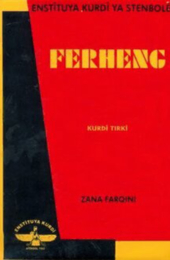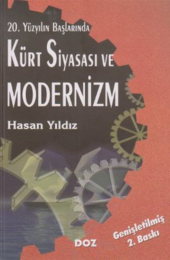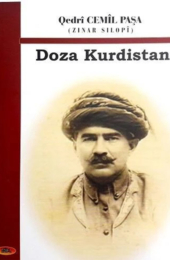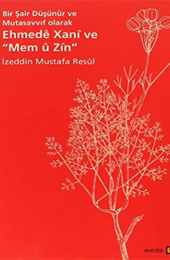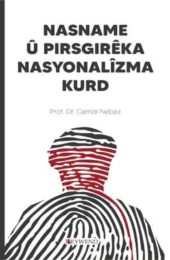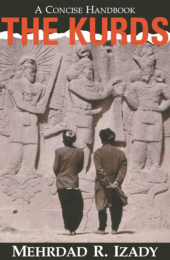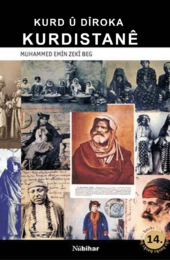Ferheng
- Ferheng Zana Farqînî is a Kurdish-Turkish dictionary authored by Zana Farqînî, a Kurdish writer, translator, and linguist born in 1967 in Diyarbakır's Silvan district, Turkey [3].
- The dictionary, titled Ferhenga Mezin ya Kurdî Tirkî : Zana Farqînî, is in Northern Kurdish (Kurmanji) and Turkish, published on September 29, 2021 [1].
- Another related work is Ferhenga Kurdî Tırkî - Zana Farqînî, published in 2007 by İstanbul Kürt Enstitüsü, featuring Kurdish-Turkish translations [2].
- This comprehensive dictionary, with 1312 pages, is recognized as one of the largest in Kurdish and Turkish, and it is available for purchase as of January 1, 2021 [4].
- Priced at 617₺, it is highly regarded for its extensive coverage of both Kurdish and Turkish languages [5].
- Zana Farqînî's contributions extend beyond dictionaries, encompassing various areas such as literature and linguistics, making him a notable figure in Kurdish language studies [6].
Stars: Zana Farqînî
Yüzyıl Başlarında Kürt Siyasası ve Modernizm
- Overview: Hasan Yıldız, a political philosophy expert, delves into the dynamics of the social structure of the Kurdish community, shaped since Ottoman rule, in his work "Kürt Siyasası ve Modernizm" (Kurdish Politics and Modernism) [1].
- Book Details: Titled "20. Yüzyılın Başlarında Kürt Siyasası ve Modernizm" (Kurdish Politics and Modernism at the Beginning of the 20th Century), Yıldız's book explores the political landscape of the Kurdish community during the early 1900s [2].
- Further Reading: Another work by Hasan Yıldız, "XX. Yüzyıl Başlarında Kürt Siyasası ve Modernizm," continues the exploration of Kurdish politics and modernism in the early 20th century [3].
- Availability: The book is available for purchase from various sources, including Kitapyurdu, Nadir Kitap, and Pandora Kitap [1] [4] [5].
- Time Period: Published in 2006, the book provides insights into the Kurdish political landscape during the specified era [2].
Note: The provided information offers a glimpse into Hasan Yıldız's exploration of Kurdish politics and modernism, but a detailed analysis requires a thorough reading of his works.
Narratives of Statelessness and Political Otherness
Narratives of Statelessness and Political Otherness
Statelessness Impact: The book "Narratives of Statelessness and Political Otherness" by Barzoo Eliassi explores how statelessness influences identity, homelessness, belonging, and the experiences of otherness. It delves into the complexities of stateless individuals, examining issues like non-belonging and voices within marginalized communities[1][2].
Kurdish and Palestinian Experiences: The book specifically focuses on the Kurdish and Palestinian experiences of statelessness, offering insights into the everyday life challenges faced by those who are stateless and marginalized[3].
Citizenship Critique: It argues that citizenship is an inadequate solution to the statelessness problem, emphasizing a critical investigation of the lived experiences of stateless individuals[4][6].
Comprehensive Exploration: The narrative explores various facets of statelessness, including identity formation, homelessness, belonging, otherness, and the limitations of citizenship as a remedy[5].
Dersim in the Kurdish History
Nuri Dêrsimî, also known as Mehmed Nuri Dersimi, played a significant role in Kurdish history, particularly during the Dersim rebellion. Here's a concise overview:
- Background:
- Nuri Dêrsimî (1893-1973) was born in Akzunik, Dersim (now Tunceli) [2].
- He was a Kurdish writer and revolutionary.
- Dersim Rebellion:
- Contributions:
- Nuri Dêrsimî's involvement reflected the broader Kurdish resistance during a crucial period in Kurdish history.
In summary, Nuri Dêrsimî was a key figure in the Dersim rebellion, contributing to the Kurdish struggle against the central government's oppression in the early 20th century.
Doza Kurdistan
- Doza Kurdistan - Qedrî Cemîlpaşa is a book authored by Zinnar Silopi (also known as Kadri Cemilpaşa). It addresses the Kurdish cause and the struggle for liberation over 60 years, providing historical insights into the plight of the Kurdish people [2][6].
- The book is available for purchase, with details provided on various online platforms such as pirtukakurdi.com and dr.com.tr [1][3][4][6].
- For more details about Kadri Cemilpaşa, the author, you can refer to the Wikipedia page titled Kadri Cemilpaşa [5].
Ehmedê Xanî
Ehmedê Xanî and Mem û Zin are subjects of the book "Bir Şair Düşünür ve Mutasavvıf olarak Ehmede Xanî ve Mem û Zin" by İzzeddin Mustafa Resul [1]. This work explores Ehmedê Xanî's role as a poet and mystic. İzzeddin Mustafa Resul draws on experiences from labor camps, providing a unique perspective influenced by the Stalin era [2]. For more insights into İzzeddin Mustafa Resul's thoughts, one can refer to his quotes on various platforms, including 1000Kitap [3]. The book serves as a valuable resource on Ehmedê Xanî's significance in Kurdish culture [4].
Stars: Izedîn Mistefa Resûl
Nasname û pirsgirêk anasyonalîzma Kurdî
The problem of Kurdish nationalism is intricately linked to identity and historical struggles. Several factors contribute to this complex issue:
- Historical Roots: Kurdish nationalism has deep historical roots, with early movements emerging in response to arbitrary political borders that divided Kurdish populations[4].
- Language and Nation-Building: Identity conflicts arise from debates over language issues in Kurdistan-Iraq, where the dominant myth influences discussions on national identity[3][6].
- International Activism: Kurdish nationalism has gained international attention, attracting support from activists involved in struggles for national minorities[1].
- Violence in the Kurdish Conflict: The nature and uses of violence play a role in the Kurdish conflict, where anti-Kurdish sentiment has risen among nationalist factions[2].
Understanding the interplay of these elements is crucial in addressing the multifaceted challenges posed by Kurdish nationalism.
Stars: Cemal Nebez
Kurds: A concise handbook
- M. Emîn Zekî Beg and Kurdish Boundaries (1931): M. Emîn Zekî Beg, an Iraqi Kurdish statesman, played a crucial role in delineating Kurdish boundaries while serving as the Minister of the Economy in the first Nuri as-Said government. This historical moment is outlined in the context of Kurdish history in Iraq[1].
- Şeref Xan's Sharafnama (Late 16th Century): The Sharafnama, authored by Şeref Xan, provides a critical analysis of Kurdish ethno-politics during the late sixteenth century. This historical text contributes to our understanding of the early modern world and the legacy of Kurdish history[4].
- Modern Kurdish Poetry (20th Century): The emergence of modern Kurdish poetry is a significant milestone in Kurdish literature, responding to the advent of modernity and nationalism in Kurdish society[5][6].
These key points highlight pivotal moments and figures in the history of the Kurds, offering insights into their socio-political and cultural evolution.
Stars: Mehrdad Izady
Kurd û Dîroka Kurdistanê
Mehmed Emin Zeki Beg (1880-1948) was born in Süleymaniye, Ottoman Empire, and his father was Hacı Abdurrahman, engaged in tobacco trade. He excelled academically during his education [2]. As an Ottoman military officer, he played a significant role in Kurdish history and diplomacy. Zeki Beg's life is documented in "Kürtler ve Kürdistan Tarihi" (Kurds and Kurdistan History) [1][4]. His story reflects the complexities of the Kurdish experience during the early 20th century, combining military service and diplomatic contributions [3][5].
Stars: M. Emîn Zekî Beg
